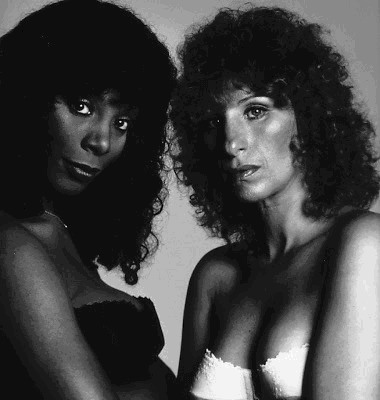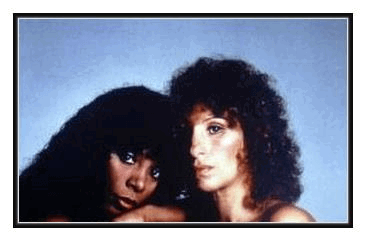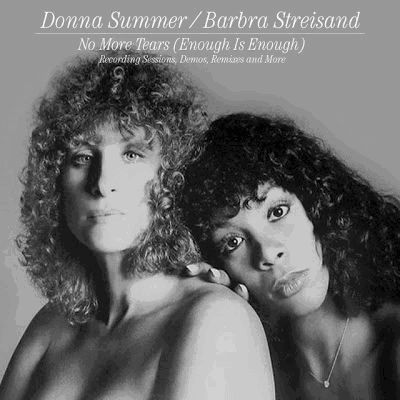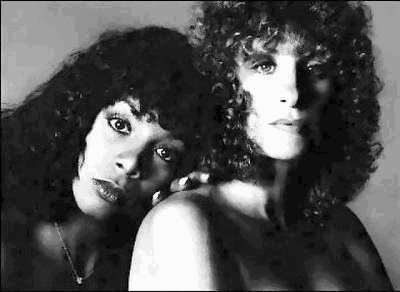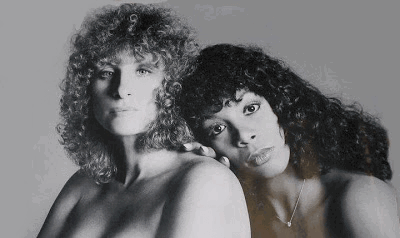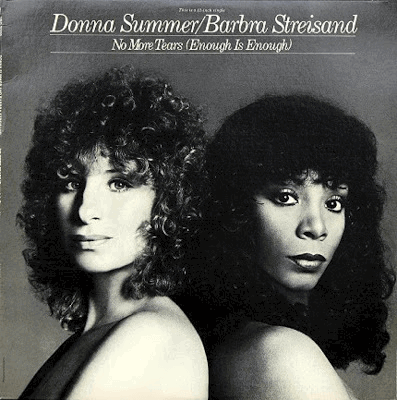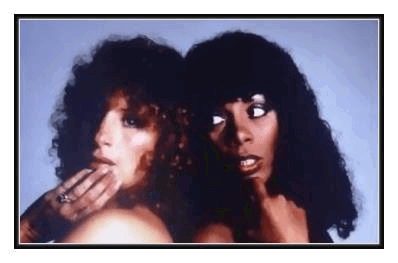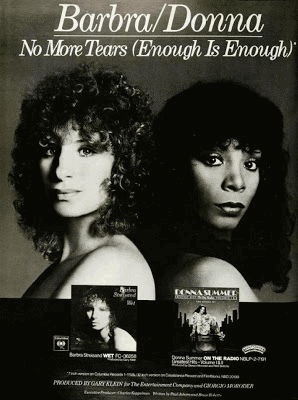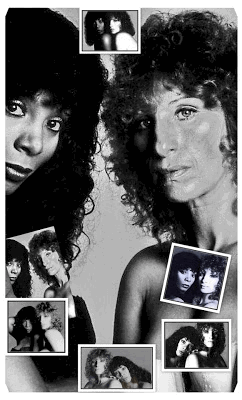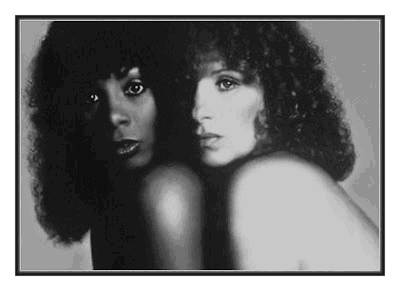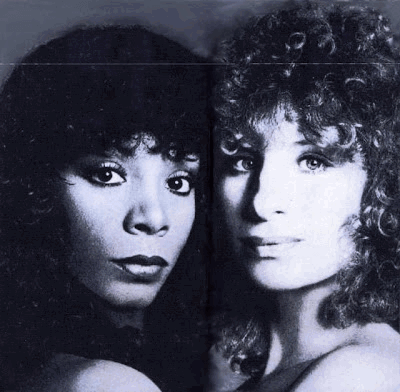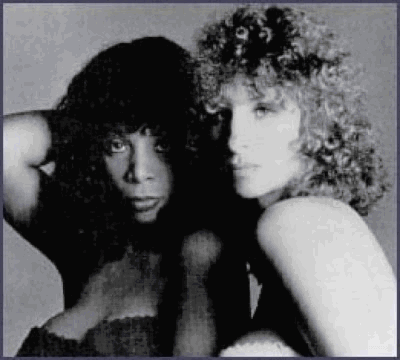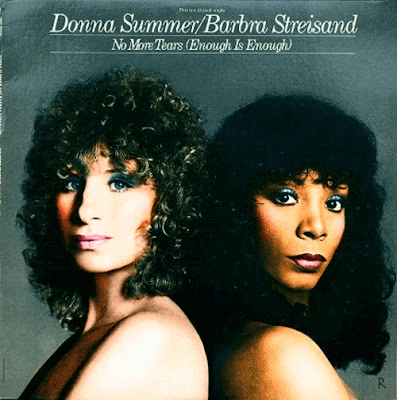one-time interracial female disco/pop duo of 1979: Barbra & Donna (Donna Summer and Barbra Streisand)
30May
Donna Summer and Barbra Streisand
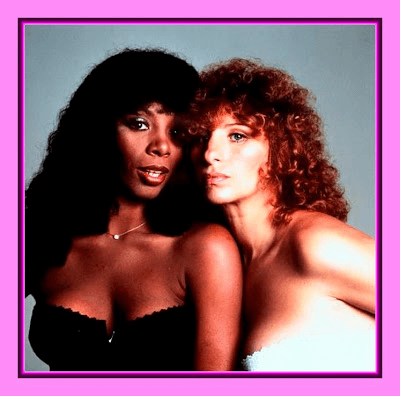
How Donna Summer and Barbra Streisand’s Famous Duet 'Enough Is Enough' Came Together.
A-list songwriter Bruce Roberts talks exclusively to THR about how he got the two singing divas in the same room, remembers his longtime friend’s incredible voice and reveals the music she had planned to record before her May 17 death.
In 1979, Donna Summer -- who died May 17 of cancer at age 63 -- and Barbra Streisand were two of the biggest singing stars on the business. Their music played across the globe. Summer was with Casablanca Records and Streisand with Columbia. But despite their stature and the layers of execs behind their careers, getting the two women to duet together on the chart-topping single "No More Tears (Enough Is Enough)" happened in one whirlwind week, according to Summer's longtime friend, songwriter Bruce Roberts.
Roberts and his partner on the single, songwriter Paul Jabara, had just co-written "The Main Event" for Streisand. Roberts had known Summer since the mid-'70s, when the singer was living in L.A.'s Nichols Canyon. "We said, 'Wouldn't it be fabulous to write a song for Barbra and Donna?' We wrote the song in literally 10 minutes," Roberts tells The Hollywood Reporter. "And [Streisand’s son] Jason Gould, who is now a very close friend, was a fan of Donna's." The two called up Streisand and before they knew it were driving over to the singer's house in the Malibu Colony with Summer. "Paul and I just trapped them in a room and played the song for them, and before any of the business people could try and stop it, it was too late. They loved it and started singing it," says Roberts, who has also written songs for the likes of Cher, Elton John, Celine Dion, k.d. lang, Whitney Houston, Alice Cooper and Dolly Parton.
Within a few days, the two singers were in the studio. "Barbra was not as comfortable in the genre of disco or dance music, so I first went in and sang Barbra’s part as a guide vocal. It was finished overnight. It was just finished so quickly. Before any of the lawyers could stop it, it was out as a record. They didn't know what hit them," says Roberts. The song -- about sending a lover packing because he "turns out to be like every other man" -- went on to spend two weeks atop the Billboard Hot 100. Roberts also recalls going with Summer and Jabara to meet with David Geffen around 1980, when the music mogul was looking to sign her as his first artist on his new Geffen Records label.
We took her out to meet David at this restaurant on Melrose and had a lovely dinner and we told her that David was the best thing in the music business, which he is and always will be because he respects creative talent," he says. "We told her he was a good guy, and she signed with him." Today, as Roberts sees it, "people don't give her enough credit for being such a brilliant writer and changing pop music which she did. Electronic dance music is based on what she did when she started. All her riffs she did with producers Giorgio Moroder and Pete Bellotte, it's based on all that. She really started a whole genre of music — going into the studio and singing 'Love to Love You' in a couple of takes. She would sing everything in a couple of takes; that was brilliance of it. "She was always called the Queen of Disco, but it was so much broader than that. She could sing in so many different kinds of voices, so many different ranges, in loud beautiful aggressive tones and soft quiet tones. She could control it in any range she was singing in, which is very rare," says Roberts. "I wrote her last No. 1 Billboard record with her, a song called 'To Paris With Love,' and we just did it in my house.
She literally got in front of my mike, I played a couple of chords, and she sang for an hour. This music flowed out of her like a waterfall." Before she died, Summer was in the midst of recording a number of dance tracks with Roberts and had been planning to record an album with legendary producer David Foster, with whom she had been performing recently. "She wasn’t thinking about her legacy," he says. On Thursday, a friend, veteran A&R exec Carol Childs, called Roberts to reminisce about Summer. "Years ago, Donna had been wearing a dress my friend admired, and she said to Donna, 'That dress is to die for.' And Donna basically said: 'Don't ever say that. This dress is to live for, not die for.' She lived her life like that."
Comments
